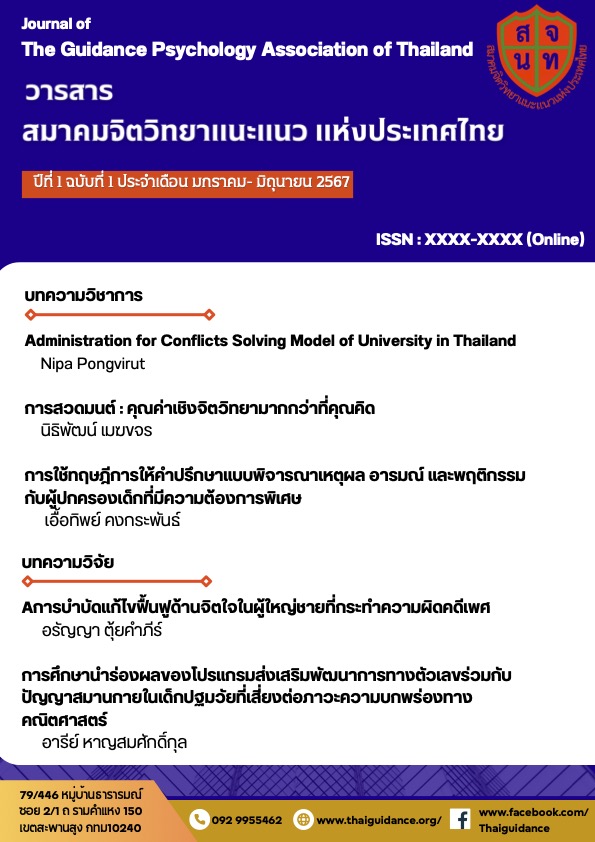Psychological Treatment in Adult Male Sex Offenders
Abstract
This study aimed to systematically review published empirical research on psychological treatment in adult male sexual offenders. The study samples consisted of evidence-based studies which published within past 10 years from relevant electronic bibliographic databases. Results showed that six studies (out of 1,581 studies) that met the selection criteria. All were the studies conducted in foreign countries (consisted of five quantitative studies and one qualitative study). The targeted population of the treatment were male sexual offenders aged 18 years or over who were detained in prisons, on probation, or released from prison and received treatment as specified by the court. The theoretical framework for psychological treatment in the studies included the risk-need-responsivity principle, the cognitive behavioral therapy, the prevention of recidivism, and the good life model. Types of the treatment program included group, individual, and mixed (i.e., individual combined with group) therapy. Treatment program duration ranged from 18 to 250 hours, during four to 61 months. Treatment providers were sexual offender treatment professionals. The treatment outcome evaluations were based on rate of risk for recidivism, factors related to recidivism (e.g., attitudes supportive of sexual violence), and report on factors facilitating successful programs.
References
สำนักงานกิจการยุติธรรม. (2562). รายงานสรุปกรอบกฎหมายและมาตรการในการป้องกันการกระทำผิดซ้ำในคดีทางเพศ. สำนักงานกิจการยุติธรรม กระทรวงยุติธรรม.
ราชกิจจานุเบกษา. (2565). พระราชบัญญัติมาตรการป้องกันการกระทำความผิดซ้ำในความผิดเกี่ยวกับเพศหรือที่ใช้ความรุนแรง พ.ศ. 2565 [ออนไลน์]. สืบค้นจาก https://www.moj.go.th/attachments/20221026080731_94190.PDF
อรัญญา ตุ้ยคำภีร์, ขัตติยา รัตนดิลก, นิรนาท แสนสา, จินตนา สิงขรอาจ, กุลวดี ทองไพบูลย์, สวรินทร์ รื่นเริง, ณธารา ฐิติธราดล, & ภวิสร์ ทวีงาม. (2564). รายงานการวิจัย เรื่อง การพัฒนามาตรฐานเรือนจำและโปรแกรมแก้ไขบำบัดฟื้นฟูผู้กระทำความผิดเกี่ยวกับเพศ เพื่อลดการกระทำผิดซ้ำ. สำนักงานกิจการยุติธรรม. รายงานอัดสำเนา.
Ede, M. O., Okeke, C. I., & Onah, S. O. (2022). A randomized controlled trial of a cognitive behaviorally informed intervention for changing violent sexual attitudes among adult sexual offenders in prison. Criminal Behaviour & Mental Health, 33(1), 46–61. https://doi.org/10.1002/cbm.2278
Pfäfflin, F., & Eher, R. (2011). The role of the International Association for the Treatment of Sexual Offenders (IATSO) in international public policy and practice. In D. P. Boer, R. Eher, L. A. Craig, M. H. Miner, & F. Pfäfflin (Eds.), International perspectives on the assessment and treatment of sexual offenders: Theory, practice, and research (pp. 655–663). Wiley-Blackwell. https://doi.org/10.1002/9781119990420.ch34
Franke, I., Streb, J., Leichauer, K., Handke, S., Dudeck, M., & Tippelt, S. (2021). Efficacy of outpatient treatment of sex offenders. International Journal of Law and Psychiatry, 79, 101738. https://doi.org/10.1016/j.ijlp.2021.101738
Lindegren, S. (2022). A pilot study of the Swedish sexual offender treatment program. Research on Social Work Practice, 32(3), 328–344. https://doi.org/10.1177/10497315211016305
Nunes, K., Babchishin, K., & Cortoni, F. (2011). Measuring treatment change in sex offenders: Clinical and statistical significance. Criminal Justice and Behavior, 38(2), 157–175. https://doi.org/10.1177/0093854810391054
Office of Domestic Violence & Sex Offender Management. (2020). Standards and guidelines for the assessment, evaluation, treatment and behavioral monitoring of adult sex offenders. Colorado Department of Public Safety, Division of Criminal Justice.
Rayment-McHugh, S., Belton, E., McKillop, N., Christensen, L. S., Prenzler, T., & Hine, L. (2022). Beyond ‘what works’: Implementing sex offender treatment programs in the ‘real world’. Journal of Offender Rehabilitation, 61(3), 148–167. https://doi.org/10.1080/10509674.2022.2045529
Seewald, K., Rossegger, A., Gerth, J., Urbaniok, F., Phillips, G., & Endrass, J. (2018). Effectiveness of a risk–need–responsivity‐based treatment program for violent and sexual offenders: Results of a retrospective, quasi‐experimental study. Legal and Criminological Psychology, 23(1), 85–99. https://doi.org/10.1111/lcrp.12122
Smid, W. J., Kamphuis, J. H., Wever, E. C., & Van Beek, D. J. (2016). A quasi-experimental evaluation of high-intensity inpatient sex offender treatment in the Netherlands. Sexual Abuse: A Journal of Research and Treatment, 28(5), 469–485. https://doi.org/10.1177/1079063214535817
Downloads
Published
How to Cite
Issue
Section
License
Copyright (c) 2024 (The Guidance Psychology Association of Thailand

This work is licensed under a Creative Commons Attribution-NonCommercial-NoDerivatives 4.0 International License.
บทความที่ได้รับการตีพิมพ์เป็นลิขสิทธิ์ของ สมาคมจิตวิทยาแนะแนวแห่งประเทศไทย
ข้อความที่ปรากฏในบทความแต่ละเรื่องในวารสารวิชาการเล่มนี้เป็นความคิดเห็นส่วนตัวของผู้เขียนแต่ละท่านไม่เกี่ยวข้องกับสมาคมจิตวิทยาแนะแนวแห่งประเทศไทย และบุคลากรท่านอื่น ๆ ใน สมาคมฯ แต่อย่างใด ความรับผิดชอบองค์ประกอบทั้งหมดของบทความแต่ละเรื่องเป็นของผู้เขียนแต่ละท่าน หากมีความผิดพลาดใดๆ ผู้เขียนแต่ละท่านจะรับผิดชอบบทความของตนเองแต่ผู้เดียว



